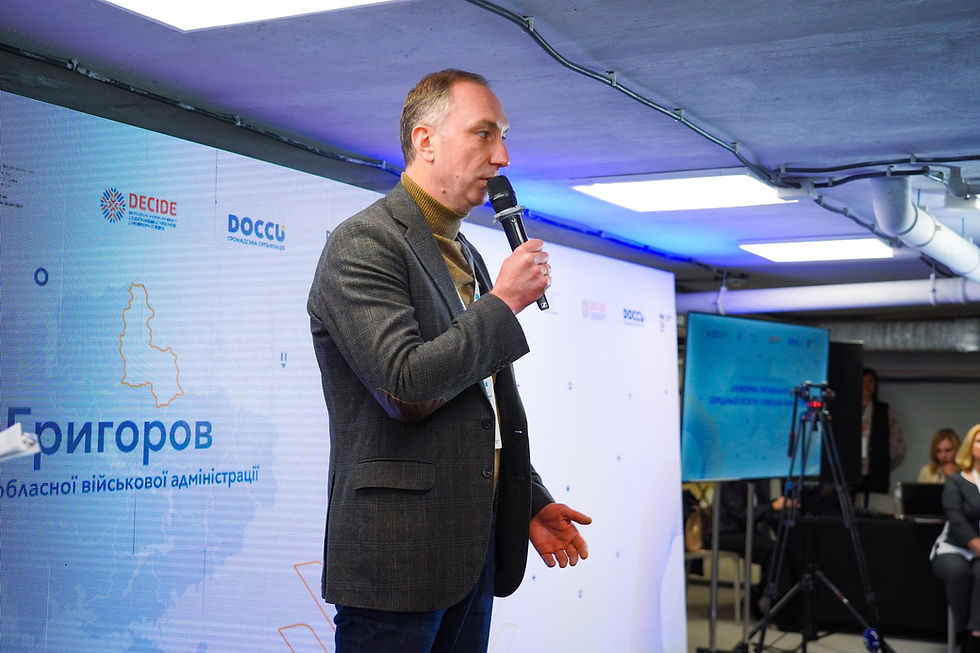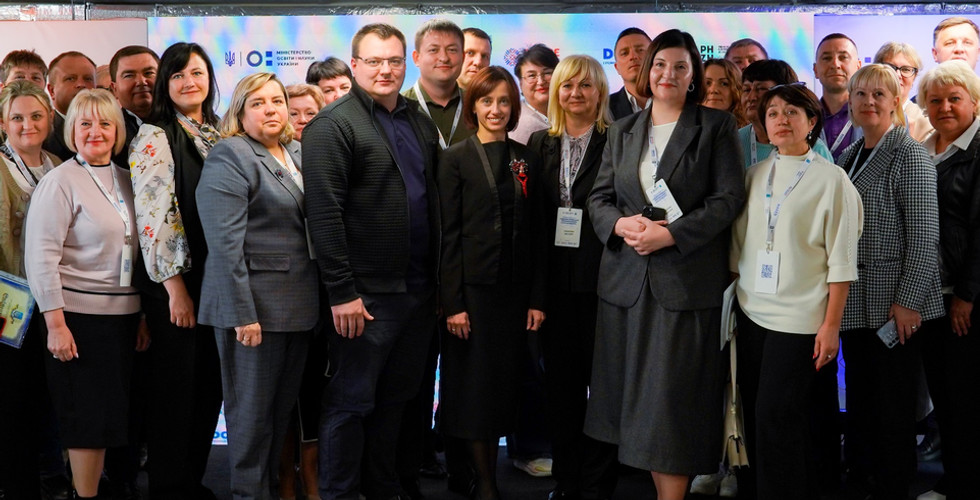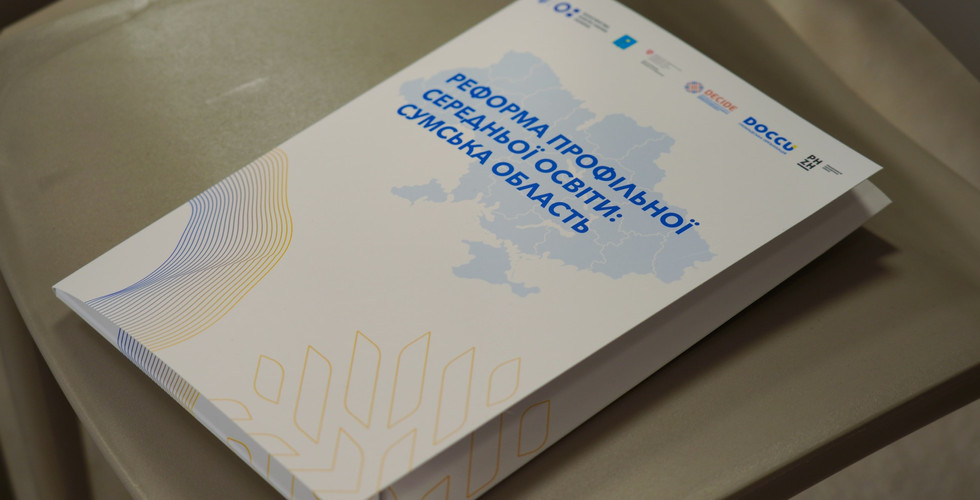Sumy region prepares to implement high school reform despite wartime challenges
- Катерина Лукомська
- Oct 3, 2025
- 5 min read
On 30 September, the Ministry of Education and Science of Ukraine, in cooperation with the DECIDE Project and local authorities, held a public discussion on secondary school reform in Romny, Sumy Region. Sumy became the 22nd region to host such meetings. To date, more than 1,200 communities from across Ukraine have participated in these discussions.
The discussion in the Sumy region was attended by Nadiia Kuzmychova, Deputy Minister of Education and Science of Ukraine; Head of the Regional Military Administration; Head of the Regional Council; Members of Parliament; Valentyna Poltorak, the DECIDE Project Manager; community leaders; and other interested individuals.
For the Sumy region, which is currently a frontline region, implementing this reform poses particular challenges. Residents of some communities have been evacuated, many educational institutions have been destroyed by shelling, and children and teachers have been relocated to safer areas. Education must now be organised in bomb shelters or remotely. The prospective network of academic lyceums developed in 2023 already needs to be significantly revised in light of the security situation.
Despite the difficulties, the Sumy region became the first region where a project network of educational institutions was modelled to provide specialised secondary education. According to the communities’ proposals, 69 educational institutions in the Sumy region are set to provide specialised secondary education, comprising 39 academic institutions and 30 vocational institutions. The draft network is currently still awaiting approval by the regional council and may undergo changes given the ongoing military operations, the constant damage and destruction to educational infrastructure, demographics, and the measures taken to evacuate the population.
Representatives of 51 communities joined the public discussion, including 40 community leaders and their deputies, as well as 51 heads and deputy heads of education management bodies. Other participants included Members of Parliament, representatives of the Regional State Administration and the Regional Council, heads and managers of education management bodies from district military administrations, representatives of educational institutions and parents.

At the beginning of the event, a survey was conducted. Of those surveyed, 62 per cent said that the community they represent plans to have its own academic lyceum; 17 per cent said that the community plans to have an academic lyceum if the security situation improves; and 21 per cent were undecided. Following the discussion, 69 per cent of respondents were in favour of the community having its own academic lyceum; 6 per cent planned to have a relocated lyceum; 3 per cent believed that specialised secondary education in their community should be provided by a regional lyceum; 13 per cent did not plan to have an academic lyceum; and 9 per cent were undecided.
Oleh Hryhorov, Head of the Sumy Regional Military Administration:
‘Educators in the Sumy region work in extremely difficult conditions, with air raid alerts lasting more than 20 hours a day. However, right now, we need to invest in the next generation because, after victory, it will be our children who will rebuild the country. We cannot view the educational process as optional – it is a priority for the state and the nation.’

Participants in the discussion emphasised that secondary school reform is not only about changes to the organisation of the educational process, but also about making strategic choices for the recovery of the country.
Oleksii Romanko, Head of the Sumy Regional Council:
‘Reforming specialised secondary education means creating new opportunities for our children, who will determine the future development of the Sumy region and Ukraine. It is about ensuring equal access and making our young people more competitive at European and global levels. Building an effective network of specialised lyceums in the communities of the region is a shared responsibility. Public discussions help generate effective and balanced solutions.’

The Deputy Minister of Education and Science emphasised the importance of open dialogue with communities.
Nadiia Kuzmychova, Deputy Minister of Education and Science of Ukraine:
‘Such meetings provide an opportunity to consider the situation on the ground and develop the most realistic scenarios for implementing the reform. Our goal is to create a high-quality, safe environment where students can acquire the necessary knowledge and skills for life, teachers can realise their potential, and administrators can work effectively. Despite all the challenges, the Sumy region is setting an example of resilience for other regions. The fact that we are discussing the development of education alongside its preservation is further evidence of this resilience.’

The reform of senior secondary education is based on adolescents making a conscious choice. After Grade 9, students must decide whether to pursue an academic path at a lyceum or a vocational path at a college. Those who opt for an academic lyceum will then be able to select a specialisation and subjects for in-depth study. Therefore, career guidance forms the foundation of the entire reform, not just a supporting element. It helps children to understand their strengths, interests, and future prospects. This was emphasised by Valentyna Poltorak, the DECIDE Project Manager. According to her, the project’s role is to assist the Government and communities in implementing senior secondary education reform and to establish a system that aligns education with the state's recovery priorities.
Valentyna Poltorak, the DECIDE Project Manager: ‘
The reform of upper secondary schools is perhaps the most important, yet also the most challenging, stage of the New Ukrainian School. Its success depends on the willingness to make difficult strategic decisions at national and local levels. However, these steps are necessary because the future of Ukrainian children is at stake. We must create a modern school for them, offering high-quality education, new infrastructure and modern materials, and technical resources. Today, we are taking important first steps in the reform, particularly in introducing a career guidance system. This is important so that Ukrainian children want to stay in Ukraine, see their future here and find their place in the labour market and in life in our country in general.’
She also emphasised that the DECIDE Project will continue to collaborate with communities, offering expert support in the planning of a network of lyceums and consulting with local authorities, parents, and educators. The project will also develop a career guidance system for schoolchildren.

During the event, the Director of the Department of Education and Science of the Sumy Regional Military Administration spoke about the specific challenges and prospects for the region.
Viktoriia Hrobova, Director of the Department of Education and Science of the Sumy Regional Military Administration:‘
The Sumy region has been working on establishing a network of senior schools since 2023. However, the war has brought significant changes: communities have been evacuated, schools have been destroyed, and children have been displaced. Currently, there are around 10,600 eighth-graders in the region, a figure that differs greatly from pre-war predictions. Nevertheless, all 51 communities have decided to transform their institutions. The prospective network currently comprises 39 academic lyceums and 69 institutions in total, which will provide comprehensive secondary education. Our task is to provide children with opportunities for development, even in these extremely challenging circumstances.’
For the Sumy region, which experiences daily shelling and has 18 evacuated communities, the discussion of the reform confirmed that even in the most challenging times, education remains a key priority and strategic planning is an integral part of future recovery.
To view the photo gallery, click on the photo.











